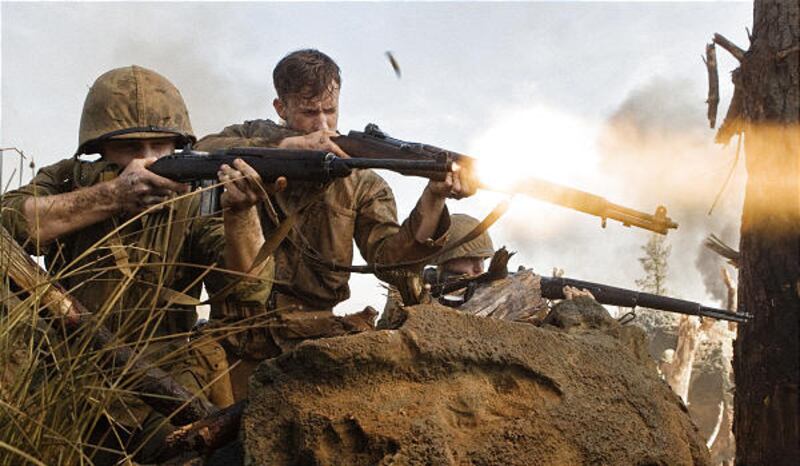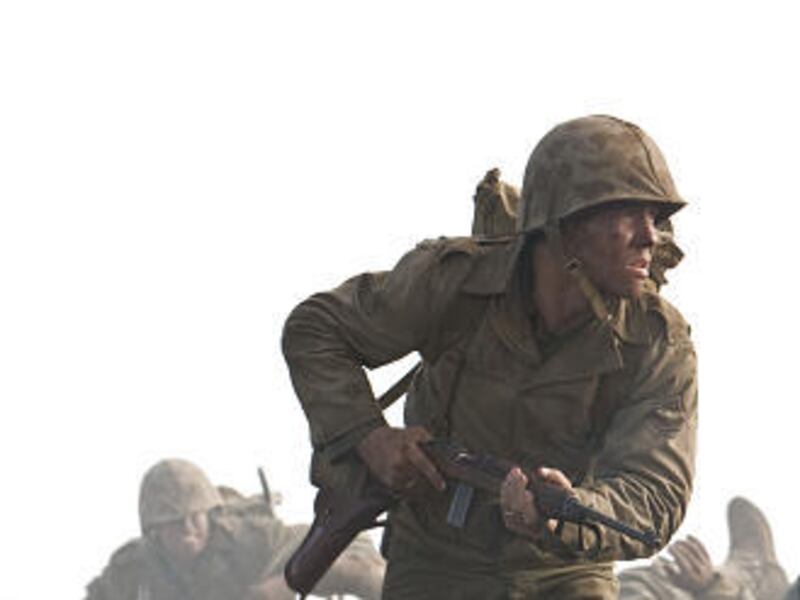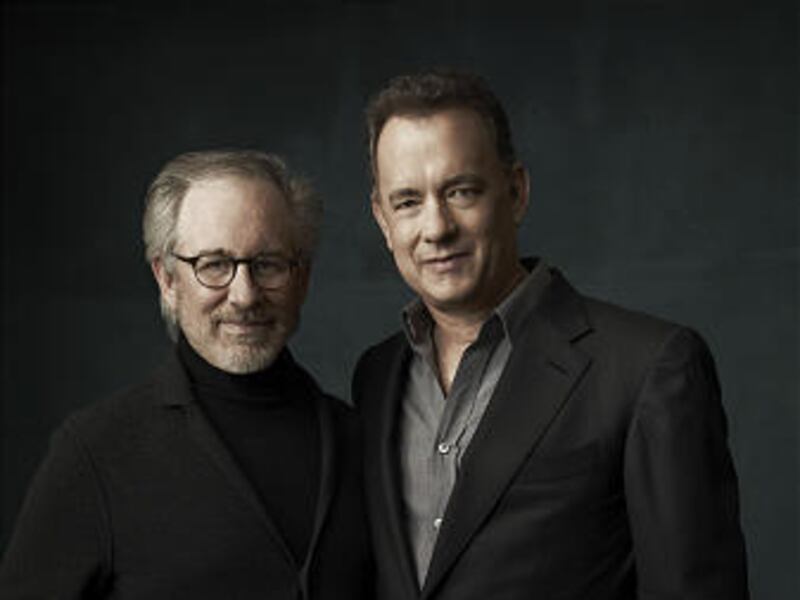PASADENA, Calif. — There was a certain inevitability about the production of the miniseries "The Pacific," according to Oscar-winner Steven Spielberg.
It was "inevitable that we would do 'The Pacific' with HBO because there was such an overwhelming response" to "Band of Brothers." And part of that was letters "that said, 'I was a veteran of the Solomans,' 'I fought at Tarawa,' and 'I was at Midway,' " Spielberg said.
"We got so many letters of veterans from the Pacific theater of operations asking us if we could acquit their stories the way we acquitted the stories of the European theater of operations."
Spielberg and Tom Hanks, who teamed up as executive producers of the 2001 miniseres "Band of Brothers" — which won a Golden Globe, a Peabody, the Humanitas Prize and half a dozen Emmys — have spent the past half-dozen years working on "The Pacific." This 10-part epic is, in many ways, the Pacific theater counterpart to the European theater "Band," but there are some fundamental differences.
"The main difference is our source material," Hanks said. "For 'Band of Brothers,' we had Stephen Ambrose's pretty magnificent, oral history — almost a piece of scholarship — in his book."
"The Pacific," however, is three intertwined stories pulled from three sources. There's Eugene Sledge's "With the Old Breed," which is "considered perhaps as great a combat memoir as has ever been produced. It is very personal, and it is very much written with his voice and with his perspective on life," Hanks said.
There's Robert Leckie's combat memoir, "Helmet on My Pillow," which is "really more like a prose poem about what it means to be young and alive and involved in a quite hideous adventure. And the story of John Basilone "is more or less taken from public record."
The miniseries follows the three Marines — Leckie (James Badge Dale), Sledge (Joe Mazzello) and Basilone (Seda) — from their homes to their first battle in Guadalcanal. To Cape Gloucester, Peleliu and Iwo Jima. To Okinawa and back home.
It's filled with shattering battle scenes, horrific violence and terror — a drama about regular guys thrust into an unbelievably tough situation.
(It's rated TV-MA — the TV equivalent of and R — for violence, strong language, nudity and sexual content.)
"But I would say that the differences between 'The Pacific' and 'Band of Brothers' are as different as the concept of the two different theaters of war in Europe," Hanks said. "By and large, the European war at World War II was the last war of its kind, in which great armies fought and decided when they began and when they did not. In Europe, an enemy soldier could throw up his hands — his war would be over.
"The war in the Pacific was more like the wars we've seen ever since — a war of racism and terror, a war of absolute horrors, both on the battlefield and in the regular living conditions. The challenge ... was to take human beings and put them through hell and wonder how in the world they would approach the world when they came back."
Episodes open with historical background to put the events in context — both because Americans are less familiar with the war against Japan and because it was more complicated and confusing.
"Quite frankly, it doesn't bend to the more ... graceful narrative that they can approach the war in Europe with," Hanks said. "The war in Europe liberated Paris. They landed at Normandy, and eventually you crossed the Rhine into the fatherland, and Berlin fell. The war in the Pacific does not fall into that brand of territorial narrative. You tell me what's important about Peleliu.
"Well, we establish what's important about Peleliu, Guadalcanal, Okinawa ... little tiny spots."
But the stories strike home with equal impact.
"I think what moved us to tell these stories based on these survivors, these veterans, was, in essence, to see what happens to the human soul throughout this particular engagement," Spielberg said. And to see what happens to those individuals throughout the entire course of events, leading up to the dropping of the two atomic bombs, is something that was very, very hard for the actors and for the writers and for all of us to put on the screen. But we felt we had to try."
The results are magnificent. This is will undoubtedly be another award-winning miniseries.
The end product impressed even Sidney Phillips, who's portrayed in "The Pacific" by Ashton Holmes.
"From what I have seen, I think they've done a very good job — especially in the respect of getting the weapons correct, getting the equipment correct and generally showing much of the combat," said Phillips, who was a lifelong friend of Sledge and served with Leckie.
"The Pacific" was filmed mainly in Australia over the course of nine months in 2007 and 2008. It's a big-budget production, and it shows. The look and feel of the 10 episodes is equal to most big-budget theatrical films.
Like Spielberg and Hanks' "Saving Private Ryan."
In a small way, the actors went through experiences similar to those of the men they portrayed. Dale said that on days when he didn't have to report to the set, he would be "sitting at home breaking down the script and worrying about relationships and all the actor-y stuff that we can go through in our mind.
"Then you show up to work, and your only objective of that day is to not get blown up. Sometimes that's easier."
But portraying real men who served their country was something that was never far from the actors' minds.
"My grandfather served in the Pacific," said Mazzello. "So ... I knew I had a tremendous responsibility to all the veterans. Then when I spoke to Eugene's sons and his wife, that became almost the most important thing — to make sure I was honoring the man that they knew so well in the best way that I could."
"It's a humbling experience to go through that — to try to portray another man who was there," said Dale. "I just hope we can do them justice."
"I think the responsibility to make sure we got this right is what drove us," said Seda. "I think there was a certain point in time for all of us where we realized how important this is. This isn't just to make another show, just to make another film or a television show. This is to be the voice for so many men — the real heroes."
The real heroes who were just young Americans. Phillips describes himself as "a 17-year-old PFC, a real nobody in the rear ranks of the Marine Corps."
"You look at war as something that is putting your best friend in jeopardy," Spielberg said. "You are responsible for the person in front of you and the person behind you and the person to the left of you and the person to the right of you. And those are the small pods that will inadvertently create a hero.
"But that is someone else's observation, not the observation of those kids in the foxholes."
If you watch ...
What: The 10-part miniseries "The Pacific"
When: Sundays at 10 p.m. from March 14-May 16
Channel: HBO
e-mail: pierce@desnews.com



